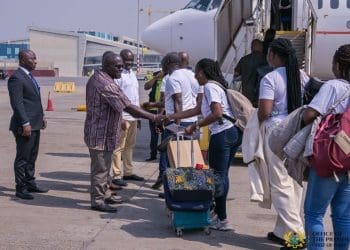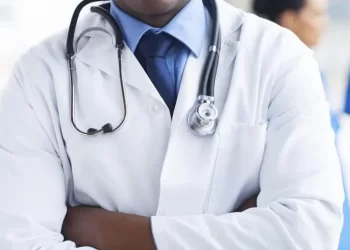In the pursuit of advancing medical testing, diagnosis, analysis, and treatment, the Health Community of West Africa (HCOWA) Association has entered into a historic partnership with the Greenfield School of Medicine to establish West Africa’s first Artificial Intelligence (AI)-powered Teaching Hospital.
The facility, to be built in Sunyani in Ghana’s Bono Region, is designed to transform the face of healthcare delivery, research, and medical education across the sub-region.
The Memorandum of Understanding (MoU) between the two institutions was signed at HCOWA’s headquarters in Accra by Madam Sihong Jiang, President of HCOWA, and Dr. Christopher Beyere Basongti, President of the Greenfield School of Medicine.
According to the parties, construction will begin in January 2026 and is expected to be completed and commissioned between June and July of the same year, serving as a central hub for innovation that applies AI technology to achieve precision, speed, and efficiency across every stage of healthcare from testing and diagnosis to treatment and recovery.
A First of Its Kind in Ghana and West Africa
The AI-Powered Greenfield Teaching Hospital will be the first facility in West Africa to operate on a fully integrated artificial intelligence system, combining robotics, predictive analytics, and digital connectivity. It will host advanced diagnostic units, smart laboratories, and data-driven patient management systems — all connected through an intelligent health network.
According to Madam Sihong Jiang, the facility will run on an AI-driven ecosystem known as Health Online (HON) — a digital platform designed to connect doctors, laboratories, researchers, and patients in real time.
“The Health Online system will act as the technological brain of the hospital,” she explained. “It will ensure that every test, every diagnosis, and every treatment decision is guided by artificial intelligence and supported by real-time data. This will redefine how hospitals in Africa deliver care — faster, more accurate, and more accessible.”
Addressing Critical Gaps in Ghana’s Healthcare System
The project stems from a comprehensive needs assessment conducted by HCOWA and the Greenfield School of Medicine, which identified four persistent barriers to effective healthcare delivery in the Bono Region and beyond — shortage of equipment, unstable medicine supply chains, lack of senior medical expertise, and chronic underfunding.
Madam Jiang said that although Ghana has made significant progress in health service delivery, many hospitals in the Bono Region still operate with outdated diagnostic machines or none at all. Patients often travel long distances to Accra or Kumasi for simple tests such as X-rays, CT scans, or laboratory analyses — delays that lead to late diagnoses, prolonged treatment, and preventable deaths.
“The AI Teaching Hospital will solve that,” she said. “It will host a centralised diagnostic system that connects all departments through the Health Online platform, enabling instant test results, remote specialist consultations, and automated data analysis.”
She added that the platform will also address persistent medicine shortages by using AI-powered inventory management to monitor stock levels, predict demand, and automatically trigger procurement before shortages occur.
“With predictive analytics, we can see ahead,” she noted. “We can prevent medicine shortages, eliminate waste, and ensure that hospitals always have what they need to save lives.”
Bridging the Gap in Medical Expertise
A major motivation for the project is the severe shortage of senior medical professionals in the Bono Region. Most specialists — radiologists, laboratory scientists, and biomedical engineers — are concentrated in major cities, leaving rural and semi-urban hospitals struggling to access expertise.
Madam Jiang emphasised that the new hospital will play a crucial role in bridging this gap. “Through AI-assisted diagnostics, telemedicine, and virtual mentorship programs, local doctors will be connected directly to international specialists,” she said. “It will allow real-time collaboration, faster decision-making, and continuous medical education, ensuring that no doctor or patient is left behind.”

Building a Hub for Education, Research, and Innovation
President of the Greenfield School of Medicine, Dr. Christopher Beyere Basongti, described the hospital as a “transformative milestone” for healthcare education in Africa. He said it would serve as a teaching and research affiliate of the Greenfield School of Medicine, offering practical training for medical students, biomedical engineers, and AI specialists.
“Through this partnership,” Dr. Basongti stated, “we will train a new generation of professionals who can blend medicine and technology to meet the complex health challenges of the 21st century. Our goal is to build capacity, promote innovation, and create a sustainable model that others in Africa can learn from.”
He added that the Health Online (HON) platform would double as a data and research centre for continuous medical innovation. “By collecting and analysing real-time health data, we can better understand disease trends, improve policy decisions, and strengthen public health planning,” he explained.
A new era for healthcare in West Africa
Once completed, the AI-Powered Greenfield Teaching Hospital will provide comprehensive medical services, including internal medicine, radiology, pathology, genetics, reproductive health, and dialysis. Every department will be digitally connected through the HON platform to ensure real-time collaboration and coordinated patient care.
Madam Jiang concluded by reaffirming HCOWA’s commitment to transforming healthcare through technology. “This project represents more than a building; it is a vision for the future,” she said. “We are laying the foundation for a healthcare system where technology amplifies human expertise, where data, compassion, and innovation come together to save lives.”
Construction is expected to start in early 2026, with full operations projected for mid-2026. When complete, the AI-Powered Greenfield School of Medicine Teaching Hospital in Sunyani will stand as a continental model for intelligent healthcare infrastructure, symbolising a new era of innovation, partnership, and progress for West Africa.














